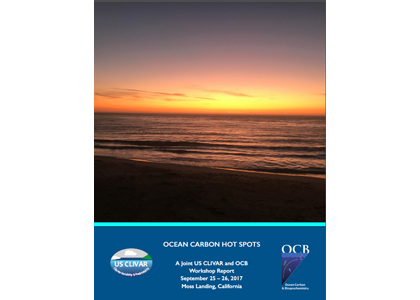Western boundary current (WBC) regions display the largest magnitude air-to-sea carbon dioxide (CO2) fluxes of anywhere in the global ocean, exhibit large spring blooms and high eddy activity, and are hubs for the subduction of anthropogenic carbon-laden waters into the ocean interior during mode water formation. Yet the influence of biophysical interactions on air-sea CO2 exchange and carbon export has not been rigorously evaluated in most WBC regions.
The report from the September 2017 Ocean Carbon Hot Spots workshop jointly organized by US CLIVAR and OCB is now available on the OCB website. This report captures highlights from the presentations, discussions, and survey results, as they align with the motivation of the workshop, and provides a set of recommendations to achieve progress on WBC carbon cycle research. Actions to address some of these recommendations are already underway. While this cross-disciplinary activity was an important first step to build momentum, continued community effort will be required to coordinate scientists around this research topic in the future. Thanks to the organizing committee for putting together an excellent, multi-disciplinary meeting and all of the workshop participants for the thoughtful discussions and engagement.





